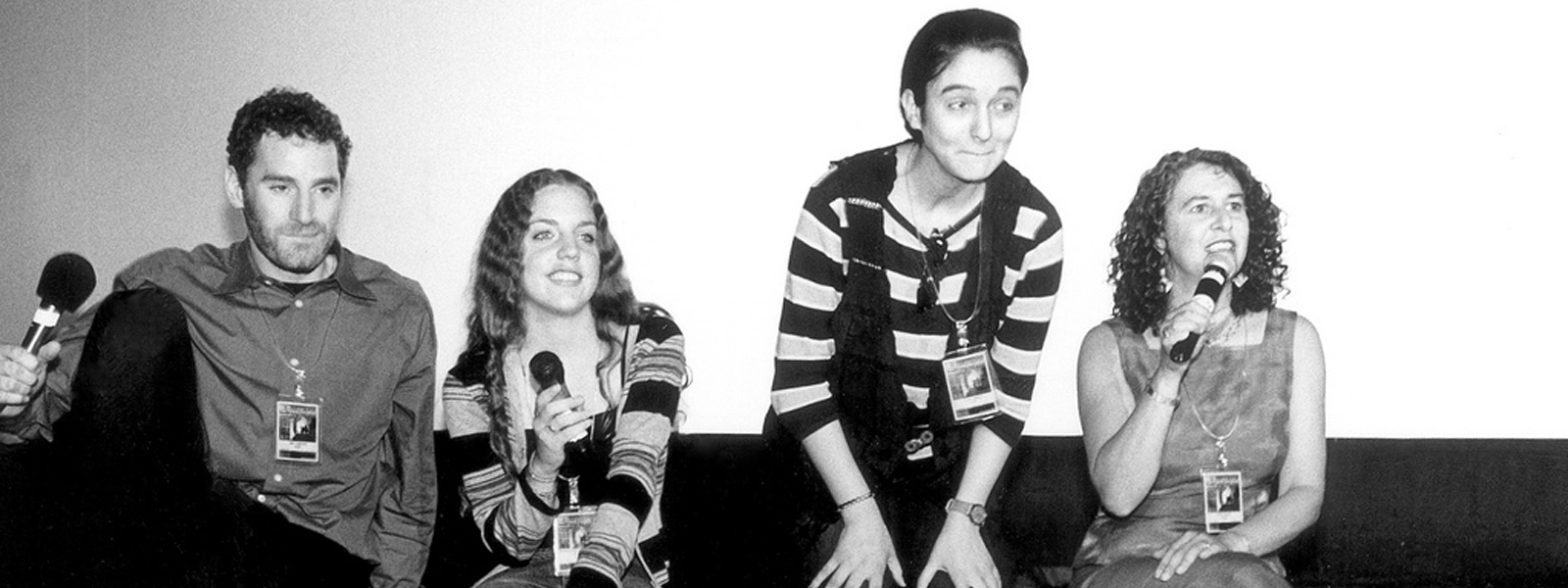
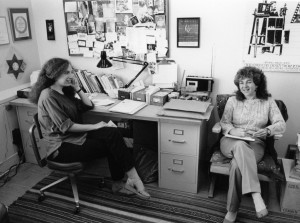
The San Francisco Jewish Film Festival (SFJFF) was conceived and founded by Deborah Kaufman in 1980. Her goal was to use cinema to spark a new and open discussion of politics and culture inside the Jewish community and to challenge Hollywood stereotypes of Jews in the public at large. Three institutions-the Judah L. Magnes Museum, the American Film Institute in Washington DC, and the UCLA Film Archives-supported the first Jewish Film Festival (1981), consisting of ten independently produced documentary and fiction films from around the world. Kaufman was joined in 1982 by Janis Plotkin, who served as Associate Director, Co-Director and Executive Artistic Director during her tenure at SFJFF. (Right: Deborah Kaufman and Janis Plotkin in the original SFJFF office in Emeryville, 1983)
The Festival was an immediate hit, featuring movies for a new generation bred on mass media but tired of Hollywood's limited portrayals of Jewish life. SFJFF sought out films with diverse points of view for those who did not affiliate with-or indeed had become disaffected by-traditional Jewish institutions. Just as importantly, SFJFF provided a safe entryway into Jewish culture for anyone willing to pay the cost of a movie ticket.
The programming approach was fresh and bold: SFJFF offered a departure from commercial presentations of Holocaust themes, which tended to emphasize Jews' victim status, while providing alternatives to the often uncritical view of life and politics in Israel available in the established American Jewish community. The Festival also made a strong point of including and celebrating films about communities not often heard from in mainstream life, including Sephardic Jewish life, the culture of Mizrahi Jews (Jews from Arab lands), LGBT stories, as well as quirky and experimental cinema that expanded the notion of Jewish film. The Festival's early years included film screenings in both Berkeley and San Francisco-first at the Roxie Theatre, and later at the venerable Castro Theatre beginning in 1988.
In its first decade, the San Francisco Jewish Film Festival reached wider audiences with three national tours sponsored by the American Film Institute and Landmark Theatres, while its screenings in the Bay Area drew ever larger audiences and national recognition. In 1990, Kaufman and Plotkin took the SFJFF to Moscow despite enormous logistical and bureaucratic obstacles. Mainstream American Jewish organizations, who were organizing airlifts of Soviet Jews to Israel, at first did not support the SFJFF's work to strengthen Jewish life and culture in the former USSR, but the significance of this event was clear: the first Moscow Jewish Film Festival drew more than 60,000 people, becoming the largest Jewish event in the history of the Soviet Union/Russia.
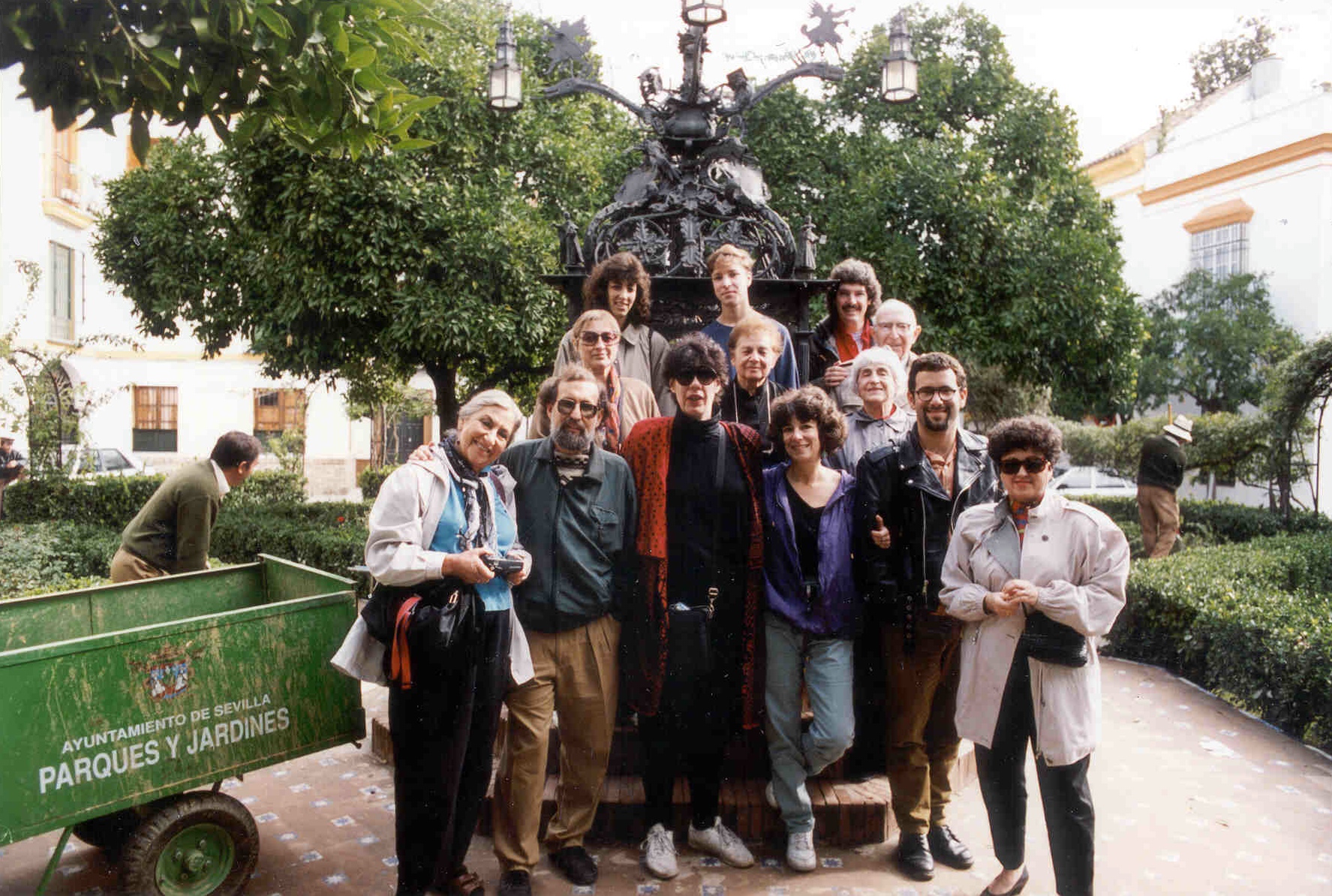
In an attempt to highlight Jewish-Arab cooperation in medieval Spain, and to put a spotlight on marginalized Sephardic and Mizrahi Jewish cultures, the Festival traveled to Madrid in 1992 for the 500th anniversary of the Inquisition and Jewish expulsion. There, the Festival reached sold-out audiences, mostly students in their 20s and 30s, who participated in electrifying discussions about the meaning of multiculturalism, even as a new European multi-ethnic war raged in the former Yugoslavia.
SFJFF also broadened its reach in its early years through a national distribution arm, Atara Releasing, and with the production of the first-ever catalog of Jewish cinema. In addition, SFJFF established a partnership with local PBS affiliate KQED, first with the weekly series called the Living Room Festival followed by an annual broadcast of films from the Festival in the "Best of the SFJFF" each fall.
In the fall of 1993, founding director Deborah Kaufman left the SFJFF after 13 years to produce documentary films. Janis Plotkin was appointed Executive Artistic Director and Caroline Libresco was hired as Associate Director. Libresco served the Festival for three years by co-programming and producing the Festival and running Atara Releasing, which shuttered in 2001. After which she moved on to a senior programmer role at the Sundance Film Festival. In late 2019 she returned to the Jewish Film Institute as the Womens Fund Programmer and continues to produce films.
Under Plotkin's leadership, SFJFF expanded the summer Festival to include screenings in the burgeoning high-tech South Bay in 1996 and to the north in Marin County in 1997. New audiences clearly had a hunger for the kind of meaty, real, food-for-thought cinema that the Festival was offering. During Plotkin's tenure, the audience reached 34,000. In 1999 the Festival launched year-round programming with monthly screenings at San Francisco's downtown multi-cultural arts center, Yerba Buena Center for the Arts, providing an opportunity for Bay Area audiences to see films on Jewish subjects year-round.The arrival of the Internet in the 1990's revolutionized communication with Festival audiences, other film programmers, and anyone interested in researching Jewish film. Under the guidance of Eviatar Shafrir and Peter Jacobson, the SFJFF launched a robust website and developed a dynamic virtual version of its film catalog, still a popular and much-accessed resource on the Jewish Film Institute's website.
In an attempt to highlight Jewish-Arab cooperation in medieval Spain, and to put a spotlight on marginalized Sephardic and Mizrahi Jewish cultures, the Festival traveled to Madrid in 1992 for the 500th anniversary of the Inquisition and Jewish expulsion. There, the Festival reached sold-out audiences, mostly students in their 20s and 30s, who participated in electrifying discussions about the meaning of multiculturalism, even as a new European multi-ethnic war raged in the former Yugoslavia. (Left: SFJFF in Madrid, 1992)
Our newsletter is the best way to keep up to date with all events, programs, offers, and benefits from the Jewish Film Institute.
Subscribe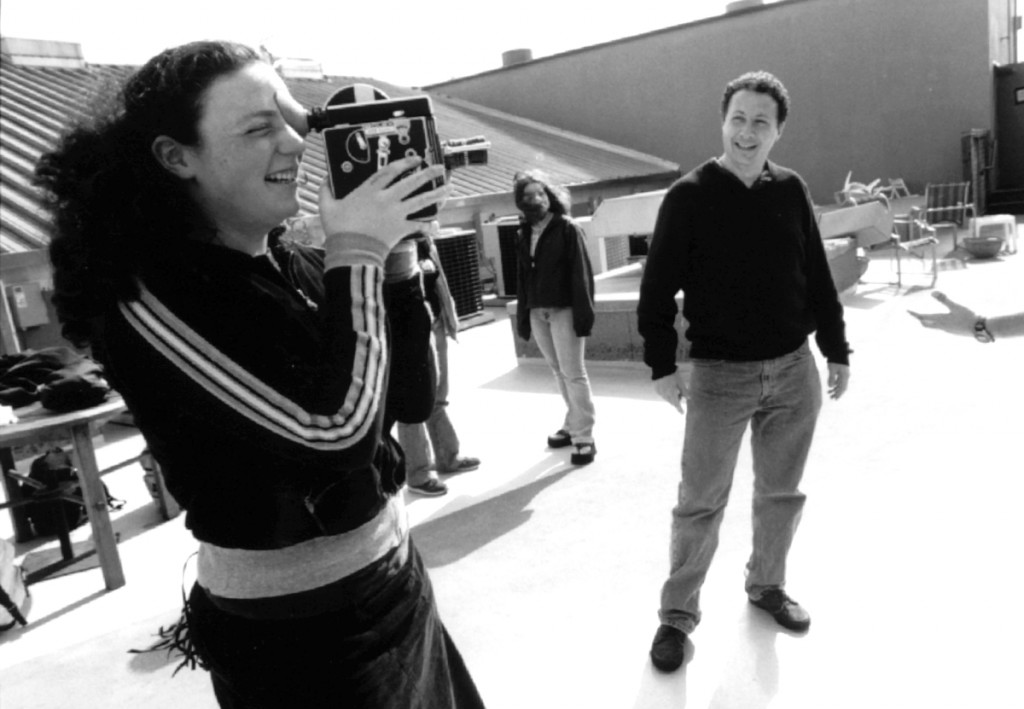
Associate Director Sam Ball helped propel the Festival deeper into the community of young viewers by launching its groundbreaking New Jewish Filmmaking Project (NJFP) in 2001. The NJFP (a project of SFJFF produced by Citizen Film) gave Bay Area teenagers the framework, training, and resources to write, shoot, and edit their own 16mm and digital films exploring Jewish themes. The NJFP expanded its offerings to include college-age and young-adult participants producing multimedia stories many of which have screened at SFJFF, at festivals around the world, and on public television.
As the Jewish film festival movement has grown (there are now more than 100 worldwide), SFJFF-drawing the largest audiences among them-plays an important leadership role in the world of independent Jewish film, offering advice and support to filmmakers and to U.S. and international Jewish film festivals. Its catalog of Jewish cinema - Independent Jewish Film: A Resource Guide, which is updated every five years and is now available online - has become a valuable resource in libraries and archives. Its chapter on "how to do your own Jewish film festival" is still something of a bible for all community-based festivals. In 2000, the SFJFF played host to the first National Conference of Jewish Film Festivals, organized by the National Foundation for Jewish Culture, with 31 participating Jewish Film Festivals.
From its earliest year, the Festival has discovered and nurtured international cinematic talents such as Amos Gitai, Dani Levy, and Peter Forgacs, sometimes long in advance of their discovery by mainstream international festivals. Nationally, the SFJFF has been an important theatrical launching pad for successful features and documentary films, such as God Is Great And I'm Not, Promises, Strange Fruit, Trembling Before G-D, Hiding And Seeking, and The Life And Times Of Hank Greenberg. Filmmakers exploring Jewish themes often start their careers by having a short film in the SFJFF and many of them return to the SFJFF with feature length documentaries and narratives.
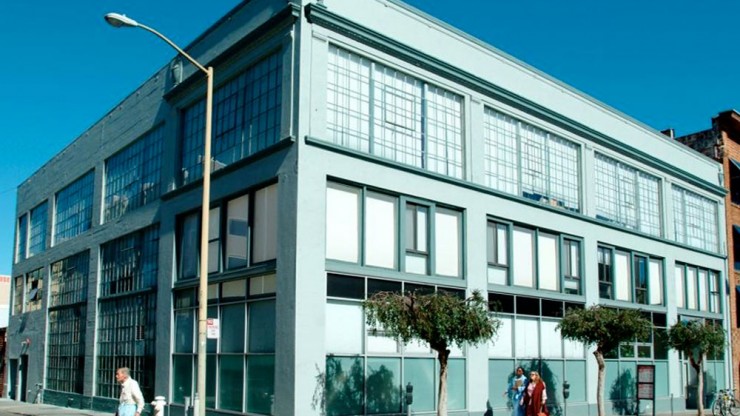
In 2002, the Festival completed its move into a permanent space, the Ninth Street Independent Film Center in San Francisco, which the Festival co-owns in a unique non-profit collaboration with its media arts partners Frameline, the Center for Asian American Media, and the Ninthth Street Media Arts Consortium. This move opened up the doors for new programming and resource collaborations with the media arts community and a new home that would secure the Festival's future in San Francisco.
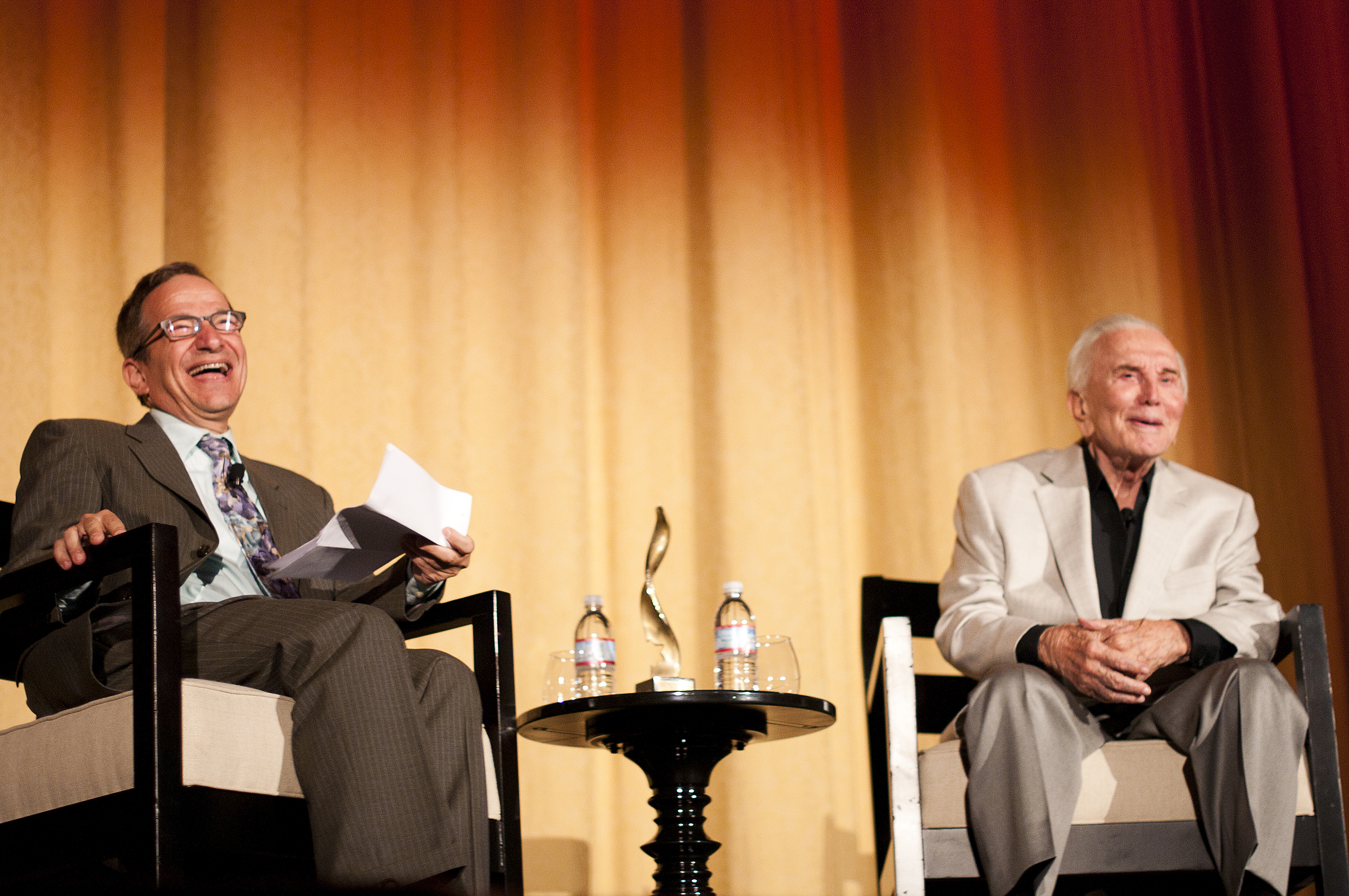
After 21 years of leadership, Janis Plotkin stepped down in 2003 and Peter L. Stein, a Peabody Award-winning documentary filmmaker and television producer, was appointed the organization's Executive Director. Stein's involvement with SFJFF began early on at KQED, where he was an advisory board member of "The Living Room Festival," and he later was a member of SFJFF's Board of Directors. Under Stein's tenure, which extended through 2011, the SFJFF welcomed both tradition and transformation. As a festival, SFJFF continued to honor the organization's long-standing respect for independent film, its willingness to explore sensitive political issues, its groundbreaking thematic programming, and its commitment to seeking out and curating world-class films. Nancy K. Fishman (who had served as the Festival's publicist from 1996-1999) joined the staff as Program Director in 2003 and continued in that capacity through the 2009 Festival. She was succeeded in 2010 by the current Program Director, Jay Rosenblatt, a longtime Bay Area independent filmmaker and educator. (Right: Peter L. Stein at the Castro Theatre with Kirk Douglas, SFJFF 2011)
During the 2000's, SFJFF expanded its year-round role as a champion of Jewish-themed film to diverse audiences, and widened the accessibility of its programs and mission. SFJFF inaugurated its annual Freedom of Expression Award given during the Festival (given to such trailblazers as Dani Levy, Sayed Kashua and Kirk Douglas); expanded its year-round service to youth and young adults through the New Jewish Filmmaking Project; launched a series of free screenings in local senior residences (affectionately nicknamed the Mitzvah Series,)...and established the Jewish Film Forum, whose members support the mission and programs of SFJFF. Through its annual programs and summer festival, SFJFF continued to welcome some 35,000 audience members annually to its theatrical programming.
Recognizing the dynamic shifts in the way audiences view, share and create media in an increasingly digital and interconnected environment, in 2009 SFJFF launched its New Media Initiative, seeking to bring SFJFF's groundbreaking model of curation, context and community to the online world. The first phase included a searchable database of 1400 SFJFF films, plus educational curricula and streaming media, including a monthly showcase of free online short films that has attracted more than 2 million views to date.
In 2010, SFJFF was named one of the 50 most innovative Jewish organizations in the U.S. by the Slingshot Fund, and was listed by IndieWire as among the top 50 film festivals worldwide - accolades that confirm and bolster SFJFF's commitment to sustaining its leadership position at the intersection of media arts and Jewish culture worldwide.
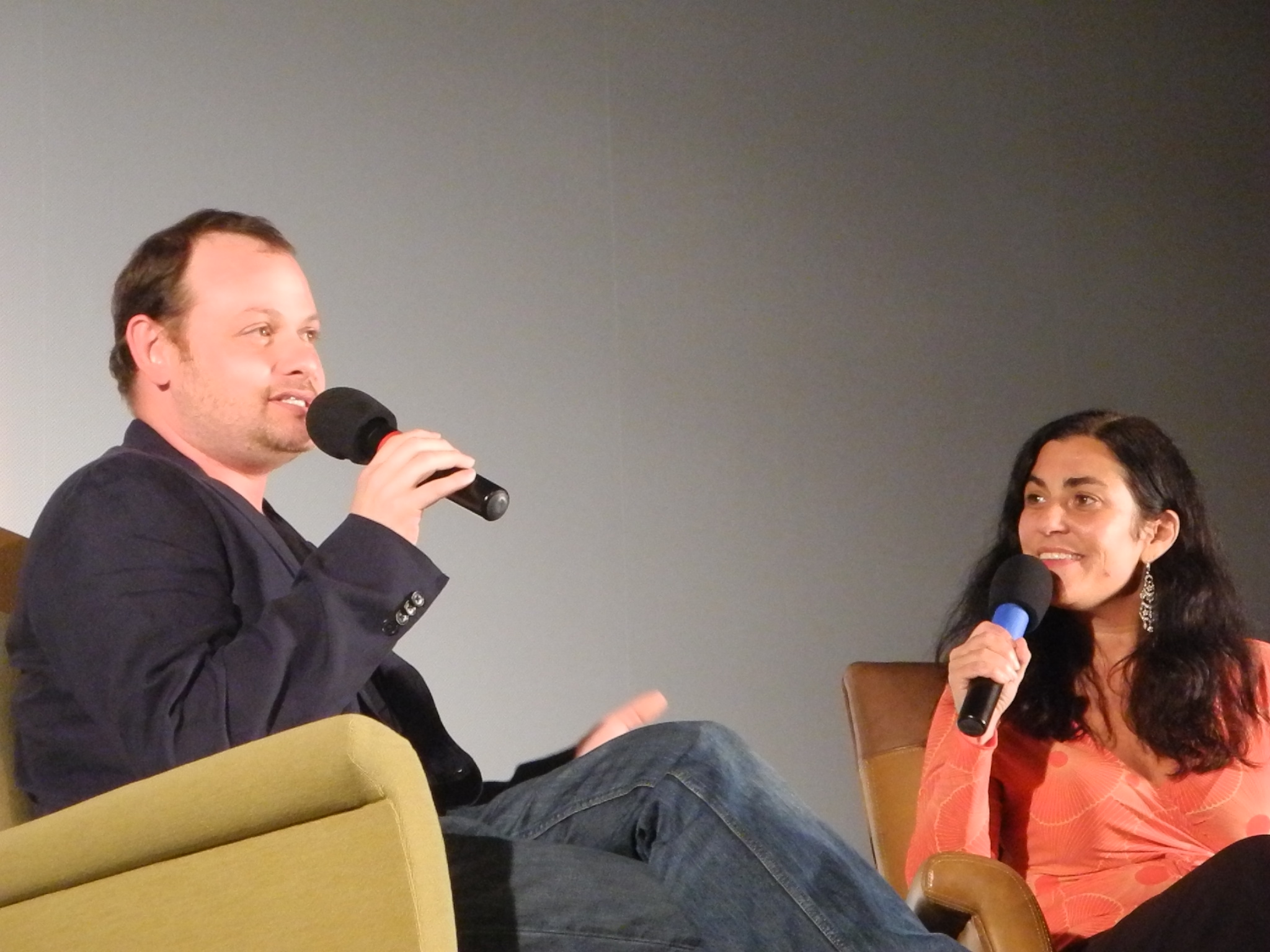
When Peter Stein stepped down in 2011, educator and award-winning independent filmmaker Lexi Leban took over as the new Executive Director. A longtime member of the Bay Area film community, Leban worked in all aspects of film, from production to distribution to exhibition. In addition to her knowledge and commitment to high-quality programming and issues of importance to a diverse community, Leban brought hands-on experience as a filmmaker and a breadth of experience as an educator working with young filmmakers and new media. The former Academic Director of the Digital Filmmaking & Video Production at the Art Institute of California and creator of their Bachelor's degree program, Leban placed a new emphasis on providing artists services and support for both emerging and established filmmakers.
Under Leban's leadership, SFJFF awarded its first filmmaker residency in 2012. The Filmmaker Residency program provides filmmakers with a private office and access to the screening room in the Ninth Street Independent Film Center; promotional support through social media and online publications; and a Meet & Greet with Bay Area's film industry professionals.
In 2013, SFJFF partnered with the independent-movie distribution company Film Movement to create the SFJFF Film Movement Award to honor the best achievement in short films focusing on Jewish themes. The award also includes an option for a non-exclusive distribution deal with Film Movement and release on DVD.
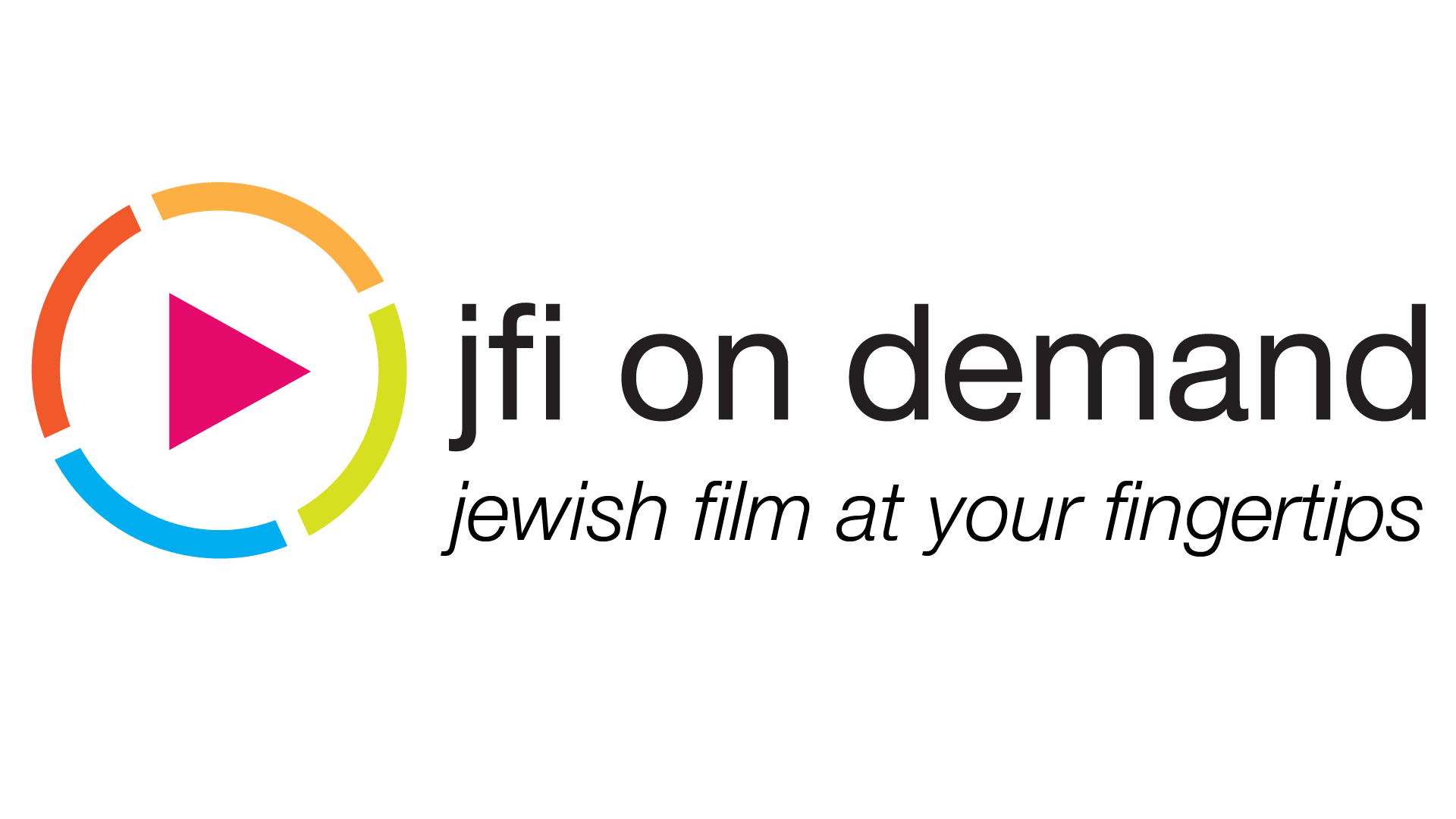
After more than three decades as the leading curatorial voice for Jewish film and media, Leban, the Board and staff of SFJFF decided it was time for a new name that better reflected the evolution of the organization and the services they were providing to filmmakers and audiences in the Bay Area and beyond.
In 2015, the San Francisco Jewish Film Festival became the Jewish Film Institute (JFI). JFI would still present the annual San Francisco Jewish Film Festival - which would retain the original name - but the organization now had a name that encompassed the entirety of their efforts and better reflected their status as a global leader in the field of media arts.Seeking to grow both its national and international audience base, Leban continued to expand JFI's online presence with the launch of JFI On Demand which debuted, along with the new Jewish Film Institute website, in the summer of 2015.
In 2017, the Jewish Film Institute refreshed its JFI On Demand initiative, offering a greater value to both educators and casual film watchers by aggregating results from different streaming platforms on its archive film pages. Web visitors can now search for films on JFI On Demand and select which platform of their choice to watch the film.
We hope you will join us as we write the next chapter of our history.
[SFJFF gratefully acknowledges Deborah Kaufman and Janis Plotkin for their contributions to writing this history.]